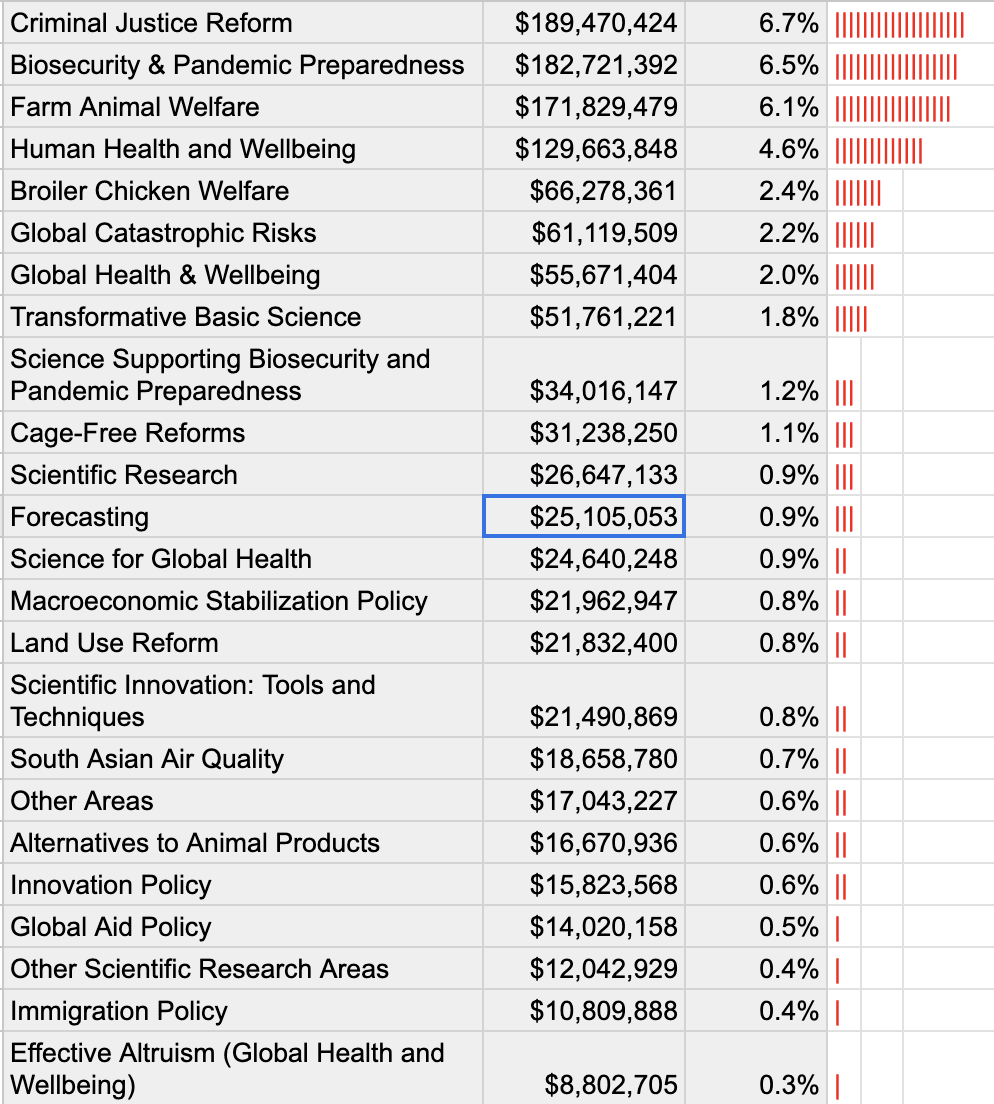Written by Benjamin Tereick
Edit: several comments here question the value of forecasting as a philanthropic cause — see this comment for a reply.
We are happy to announce that we have added forecasting as an official grantmaking focus area. As of January 2024, the forecasting team comprises two full-time employees: myself and Javier Prieto. In August 2023, I joined Open Phil to lead our forecasting grantmaking and internal processes. Prior to that, I worked on forecasts of existential risk and the long-term future at the Global Priorities Institute. Javier recently joined the forecasting team in a full-time capacity from Luke Muehlhauser’s AI governance team, which was previously responsible for our forecasting grantmaking.
While we are just now launching a dedicated cause area, Open Phil has long endorsed forecasting as an important way of improving the epistemic foundations of our decisions and the decisions of others. We have made several grants to support the forecasting community in the last few years, e.g., to Metaculus, the Forecasting Research Institute, and ARLIS. Moreover, since the launch of Open Phil, grantmakers have often made predictions about core outcomes for grants they approve.
Now with increased staff capacity, the forecasting team wants to build on this work. Our main goal is to help realize the promise of forecasting as a way to improve high-stakes decisions, as outlined in our focus area description. We are excited both about projects aiming to increase the adoption rate of forecasting as a tool by relevant decision-makers, and about projects that provide accurate forecasts on questions that could plausibly influence the choices of these decision-makers. We are interested in such work across both of our portfolios: Global Health and Wellbeing and Global Catastrophic Risks. [1]
We are as of yet uncertain about the most promising type of project in the forecasting focus area, and we will likely fund a variety of different approaches. We will also continue our commitment to forecasting research and to the general support of the forecasting community, as we consider both to be prerequisites for high-impact forecasting. Supported by other Open Phil researchers, we plan to continue exploring the most plausible theories of change for forecasting. I aim to regularly update the forecasting community on the development of our thinking.
Besides grantmaking, the forecasting team is also responsible for Open Phil’s internal forecasting processes, and for managing forecasting services for Open Phil staff. This part of our work will be less public, but we will occasionally publish insights from our own processes, like Javier’s 2022 report on the accuracy of our internal forecasts.
- ^
It should be noted that administratively, the forecasting team is part of the Global Catastrophic Risks portfolio, and historically, our forecasting work has had closer links to that part of the organization.


Thanks, I think that's a good question. Some (overlapping) reasons that come to mind that I give some credence to:
a) relevant markets are simply making an error in neglecting quantified forecasts
b) relevant players train the relevant skills sufficiently well into their employees themselves (e.g. that's my fairly uninformed impression from what Jane Street is doing, and maybe also Bridgewater?)
c) quantified forecasts are so uncommon that it still feels unnatural to most people to communicate them, and it feels cumbersome to be nailed down on giving a number if you are not practiced in it
d) forecasting is a nerdy practice, and those practices need bigger wins to be adopted (e.g. maybe similar to learning programming/math/statistics, working with the internet, etc.)
e) maybe more systematically I'm thinking that it's often not in the interest of entrenched powers to have forecasters call bs on whatever they're doing.
f) maybe previous forecast-like practices ("futures studies", "scenario planning") maybe didn't yield many benefits and made companies unexited about similar practices (I personally have a vague sense of not being impressed by things I've seen associated with these words)